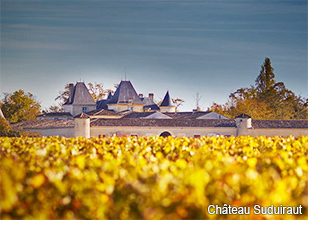
A noble year for noble rot
It is one of the exquisite pleasures of the wine world, luscious and very sweet, but not cloying. In a good Sauternes, acidity should be as concentrated as sugar. It's a compelling combination, and when we taste en primeur, we find these difficult to spit out. And it's all down to a fungus. Noble rot looks horrible when it spreads through a vineyard, but the effects are magical. It draws out water from the grapes without splitting their skins, concentrating sugar and acidity.
It also demands particular vineyard conditions to spread: humid, foggy mornings followed by dry, sunny afternoons. The morning fogs come about naturally enough in Sauternes, when the cool Ciron river flows into the warm, tidal Garonne. If the sunny afternoons don't follow, you end up with malevolent grey rot which splits and spoils the grapes. Being a Sauternes producer is no easy thing.
And they have had it tough in recent years. In 2017, Sauternes and Barsac were badly hit by frost, in 2018 it was hail and mildew. In the dry years of 2020 and 2022, noble rot struggled to even develop. But in 2023, Sauternes and Barsac excelled. A combination of rain and warmth saw the early, widespread development of botrytis in grapes that already had high levels of acidity. Then the warm, dry weather at the end of September concentrated these grapes. These were textbook conditions for great sweet wines, and the 2023 Sauternes are absolutely riveting to taste. The electric combination of sweetness and energy is rarely so well expressed. /NT
Read the full vintage report here
| Vintage | Description | Cs Sz | Bt Sz | Cs | Bts | Cs ib | Cs inc | Bt inc | ||
|---|---|---|---|---|---|---|---|---|---|---|
| 2023 | Coutet (Barsac) | 6x | 75cl | 1 | 0 | £150.00 | - | - | Buy | |
| 2023 | Coutet (Barsac) | 12x | 37.5cl | 1 | 0 | £165.00 | - | - | Buy | |
| 2023 | Suduiraut (Sauternes) | 12x | 37.5cl | 1 | 0 | £275.00 | - | - | Buy |